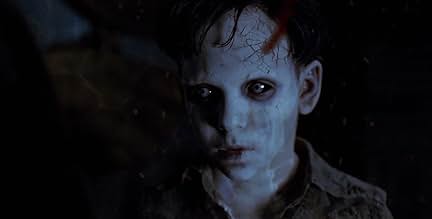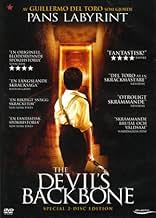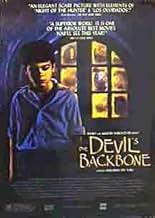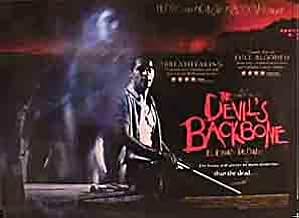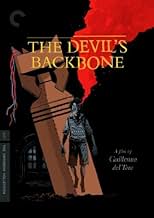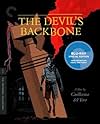VALUTAZIONE IMDb
7,4/10
73.579
LA TUA VALUTAZIONE
Dopo che Carlos, un dodicenne il cui padre è morto durante la guerra civile spagnola, arriva in un minaccioso orfanotrofio per ragazzi, scopre che la scuola è infestata e ha molti oscuri seg... Leggi tuttoDopo che Carlos, un dodicenne il cui padre è morto durante la guerra civile spagnola, arriva in un minaccioso orfanotrofio per ragazzi, scopre che la scuola è infestata e ha molti oscuri segreti che deve scoprire.Dopo che Carlos, un dodicenne il cui padre è morto durante la guerra civile spagnola, arriva in un minaccioso orfanotrofio per ragazzi, scopre che la scuola è infestata e ha molti oscuri segreti che deve scoprire.
- Regia
- Sceneggiatura
- Star
- Premi
- 6 vittorie e 11 candidature totali
Francisco Maestre
- El Puerco
- (as Paco Maestre)
Javier Bódalo
- Búho
- (as Javier González Madrigal)
Recensioni in evidenza
THE DEVIL'S BACKBONE is a Spanish language supernatural thriller. It consists of a haunted school for orphaned boys. Now, in an American film that would be all you get, a ghost running around scaring the young inhabitants of the gloomy building. That's it, and it would not be scary at all. It is to the credit that the makers of THE DEVIL'S BACKBONE present the actual ghost as the least frightening aspect of the film; he becomes, in fact, the moral center of a deeply complex story.
In Spain, the year is 1939 and Franco's army is advancing towards the small village where the most notable landmark is an impotent bomb jutting out of the ground in the center of the town. A child, Carlos (Fernando Tielve), his father's life taken in the bloody civil war, finds refuge with the Leftist caretakers of the school. Not a good place to be around at that time. He finds himself under the wing of Prof. Casares (Fererico Luppi), a strange intellectual who fears the oncoming dirge of Franco's forces. There is also some intrigue involving the caretaker Jacinto (Edvardo Noriega) and the revolution's small supply of gold. Oh, right and there is a troubled spirit of one of the dead children creeping through the bowls of the school, uttering ominous warnings to young Carlos ("Many of you will die.")...
It is one of the strongest elements of THE DEVIL'S BACKBONE that it does not become distracted by the ghost story, I mean what is one ghost compared to the very real fears of war, death, greed, abandonment, political persecution, abuse at the hands of adults, lust, and acceptance. A spirit cannot hurt us, it does not exist on the same plain of the living. His life has ended and he can no longer be troubled by the reality the characters face. A bullet or explosion wil not penetrate his flesh, he no longer feels pain. The boys who survive him are those who have to struggle for their small place on this earth.
The film paints in detailed strokes and does not cut corners when it comes to the emotions involved in the plot. The characters are not pawns to be startled periodically by cats or loud noises, they just happen to occupy the same space with a sad and restless dead boy.
The director, Guillermo Del Toro (CRONOS, MIMIC, the better-than-the-original-but-that-ain't-saying-much BLADE 2), handles the material very well, never losing sight of the story he has set out to tell. The metaphors he uses (the bomb, the pool, the contents of the jars) are rich and creative. Del Toro, along with his crew and actors, create moments of intense fear and unsettling action; the musical score, by Javier Navarette, is particularly effective. The film is dark and gloomy (perhaps overly so at times), but never succumbs to the easy answers in the shadows. As for the American films it will be compared to: THE OTHERS-not scary, THE RING-not scary, DARKNESS FALLS-not scary...THE DEVIL'S BACKBONE is scary, complex and ultimately memorable.
8/10.
In Spain, the year is 1939 and Franco's army is advancing towards the small village where the most notable landmark is an impotent bomb jutting out of the ground in the center of the town. A child, Carlos (Fernando Tielve), his father's life taken in the bloody civil war, finds refuge with the Leftist caretakers of the school. Not a good place to be around at that time. He finds himself under the wing of Prof. Casares (Fererico Luppi), a strange intellectual who fears the oncoming dirge of Franco's forces. There is also some intrigue involving the caretaker Jacinto (Edvardo Noriega) and the revolution's small supply of gold. Oh, right and there is a troubled spirit of one of the dead children creeping through the bowls of the school, uttering ominous warnings to young Carlos ("Many of you will die.")...
It is one of the strongest elements of THE DEVIL'S BACKBONE that it does not become distracted by the ghost story, I mean what is one ghost compared to the very real fears of war, death, greed, abandonment, political persecution, abuse at the hands of adults, lust, and acceptance. A spirit cannot hurt us, it does not exist on the same plain of the living. His life has ended and he can no longer be troubled by the reality the characters face. A bullet or explosion wil not penetrate his flesh, he no longer feels pain. The boys who survive him are those who have to struggle for their small place on this earth.
The film paints in detailed strokes and does not cut corners when it comes to the emotions involved in the plot. The characters are not pawns to be startled periodically by cats or loud noises, they just happen to occupy the same space with a sad and restless dead boy.
The director, Guillermo Del Toro (CRONOS, MIMIC, the better-than-the-original-but-that-ain't-saying-much BLADE 2), handles the material very well, never losing sight of the story he has set out to tell. The metaphors he uses (the bomb, the pool, the contents of the jars) are rich and creative. Del Toro, along with his crew and actors, create moments of intense fear and unsettling action; the musical score, by Javier Navarette, is particularly effective. The film is dark and gloomy (perhaps overly so at times), but never succumbs to the easy answers in the shadows. As for the American films it will be compared to: THE OTHERS-not scary, THE RING-not scary, DARKNESS FALLS-not scary...THE DEVIL'S BACKBONE is scary, complex and ultimately memorable.
8/10.
10Gafke
The year is 1939. The Spanish Civil War is nearing its bloody end. Ten year old Carlos, the orphaned son of a slain Republican, is left by his tutor at an isolated orphanage for boys. The school is destitute, barely able to provide enough food for the children, but headmistress Carmen and Dr. Casares do the best they can. Carlos accepts his fate bravely, but there are still school bullies to contend with, an unexploded bomb sitting in the courtyard as a constant reminder of the war which still rages, and an abusive caretaker named Jacinto who has his own secret agenda. As if that were not enough, a ghost begins stalking Carlos, the ghost of a boy named Santi whose demise is shrouded in mystery and who solemnly warns Carlos that many will soon die. As the war begins closing in on the orphanage, violence erupts within and Santi's prediction comes sadly true. But the worst has not yet happened. The abandoned boys must band together if they hope to survive, and the dead will aid their cause if they are to be avenged.
This is a beautiful movie, absolutely gorgeous from start to finish. The dusty, isolated landscape is a ghost itself and the constant threat of violence - from the war, to the bullies and, of course, from the traitorous Jacinto - gives this film an unrelenting atmosphere of tension and dread. The acting is superb, from the children as well as the adults. Federico Luppi as Dr. Casares is superb, providing us with a true hero, a gentleman of class and compassion. Eduardo Noriega is perfectly cast as the despicable Jacinto, making you despise him more and more as the film progresses. This is not just a ghost story, though the figure of Santi is central and key to everything that happens. It is a tale of love and honor as well as horror and ruin. It is a coming of age story and an adult drama. It also manages to be scary as hell when it wants to be.
Guillermo del Toro has made a masterpiece with "The Devils Backbone." Ten stars for this hauntingly lovely epic.
This is a beautiful movie, absolutely gorgeous from start to finish. The dusty, isolated landscape is a ghost itself and the constant threat of violence - from the war, to the bullies and, of course, from the traitorous Jacinto - gives this film an unrelenting atmosphere of tension and dread. The acting is superb, from the children as well as the adults. Federico Luppi as Dr. Casares is superb, providing us with a true hero, a gentleman of class and compassion. Eduardo Noriega is perfectly cast as the despicable Jacinto, making you despise him more and more as the film progresses. This is not just a ghost story, though the figure of Santi is central and key to everything that happens. It is a tale of love and honor as well as horror and ruin. It is a coming of age story and an adult drama. It also manages to be scary as hell when it wants to be.
Guillermo del Toro has made a masterpiece with "The Devils Backbone." Ten stars for this hauntingly lovely epic.
10Libretio
THE DEVIL'S BACKBONE (El Espinazo del Diablo)
Aspect ratio: 1.85:1
Sound format: Dolby Digital
During the Spanish Civil War, a young orphan boy (Fernando Tielve) is sent to an isolated boarding school where he encounters the ghost of a murdered child (Junio Valverde) who warns him of impending disaster...
A masterpiece. Filmed in Spain by writer-director Guillermo del Toro following his unhappy Hollywood debut (MIMIC), this spellbinding melodrama works both as an examination of the political turmoil which characterized the Spanish Civil War, and as a simple ghost story in which a tragic spirit seeks vengeance for a terrible crime. Employing restless camera-work and atmospheric set designs to their best advantage, del Toro visualizes his own script (co-written with Antonio Trashorras and David Muñoz) as the story of a vulnerable child cast adrift in a strange new world, where he must contend not only with everyday problems (such as the school bully, Ínigo Garcés, whose motives are rather more complex than they first appear), but also his frequent encounters with the unhappy ghost, some of which are genuinely unsettling (watch out for the heart-stopping sequence in which Tielve is besieged in a closet by the enraged phantom).
Production values are first-class throughout, ranging from César Macarrón's evocative art direction and Salvador Mayolas' ultra-creepy sound design, through to Luis de la Madrid's crisp editing skills and Javier Navarrete's unforgettable music score. Visual effects and makeup designs are also superb, though deliberately underplayed for maximum emotional effect. The cast is toplined by Spanish movie veterans Marisa Paredes (a favorite of Pedro Almodóvar) and Federico Luppi (CRONOS), and there are impressive turns by Irene Visedo as a young woman whose loyalties are divided by circumstances, and rising star Eduardo Noriega (the Spanish equivalent of Brad Pitt) as Visedo's boyfriend, an orphan-turned-caretaker whose volatile nature leads to a dramatic conclusion, with appalling consequences for everyone around him. Tielve is magnificent as the wide-eyed innocent at the center of the narrative, and Garcés is every bit his equal as the bully who reclaims his dignity during a climactic showdown with the forces of evil. Released around the same time as THE OTHERS (2001) - another Spanish ghost story, filmed in English as a vehicle for Nicole Kidman - THE DEVIL'S BACKBONE was consigned to Art-house distribution by virtue of its status as a subtitled movie and suffered a comparative loss at the US box-office, though del Toro's magical fever dream is unquestionably the better of the two films.
(Spanish dialogue)
Aspect ratio: 1.85:1
Sound format: Dolby Digital
During the Spanish Civil War, a young orphan boy (Fernando Tielve) is sent to an isolated boarding school where he encounters the ghost of a murdered child (Junio Valverde) who warns him of impending disaster...
A masterpiece. Filmed in Spain by writer-director Guillermo del Toro following his unhappy Hollywood debut (MIMIC), this spellbinding melodrama works both as an examination of the political turmoil which characterized the Spanish Civil War, and as a simple ghost story in which a tragic spirit seeks vengeance for a terrible crime. Employing restless camera-work and atmospheric set designs to their best advantage, del Toro visualizes his own script (co-written with Antonio Trashorras and David Muñoz) as the story of a vulnerable child cast adrift in a strange new world, where he must contend not only with everyday problems (such as the school bully, Ínigo Garcés, whose motives are rather more complex than they first appear), but also his frequent encounters with the unhappy ghost, some of which are genuinely unsettling (watch out for the heart-stopping sequence in which Tielve is besieged in a closet by the enraged phantom).
Production values are first-class throughout, ranging from César Macarrón's evocative art direction and Salvador Mayolas' ultra-creepy sound design, through to Luis de la Madrid's crisp editing skills and Javier Navarrete's unforgettable music score. Visual effects and makeup designs are also superb, though deliberately underplayed for maximum emotional effect. The cast is toplined by Spanish movie veterans Marisa Paredes (a favorite of Pedro Almodóvar) and Federico Luppi (CRONOS), and there are impressive turns by Irene Visedo as a young woman whose loyalties are divided by circumstances, and rising star Eduardo Noriega (the Spanish equivalent of Brad Pitt) as Visedo's boyfriend, an orphan-turned-caretaker whose volatile nature leads to a dramatic conclusion, with appalling consequences for everyone around him. Tielve is magnificent as the wide-eyed innocent at the center of the narrative, and Garcés is every bit his equal as the bully who reclaims his dignity during a climactic showdown with the forces of evil. Released around the same time as THE OTHERS (2001) - another Spanish ghost story, filmed in English as a vehicle for Nicole Kidman - THE DEVIL'S BACKBONE was consigned to Art-house distribution by virtue of its status as a subtitled movie and suffered a comparative loss at the US box-office, though del Toro's magical fever dream is unquestionably the better of the two films.
(Spanish dialogue)
'El Espinazo Del Diablo' is set in an orphanage (that beautifully symolizes Spain during the civil war) just before the fall of Catalonia. It works both as a gripping political drama and an engaging ghost story. Del Toro brings cleverly brings the elements of both genres together to tell the story, something he also accomplished in his more recent 'El Fauno del Laberinto' (where he amazingly combines fantasy horror with political drama).
Just like with 'El Fauno del Laberinto', Del Toro has taken care that this film isn't neglected in the aspects of film-making. The cinematography stands out. The yellowish tint stresses on the stifling heat and adds to the deserted isolation of the orphanage. The use of symbolism and riddles is remarkable. The details, e.g. flies buzzing around corpses, dusty atmosphere etc are given considerable attention. Visuals are just as impressive e.g. bloody flying in the air like a part of the wing. Del Toro extracts fine performance from all the actors. Seasoned actors like Federico Luppi, Marisa Paredes and Eduardo Noriega (in a menacing role) are superb to say the least but the child actors too hold their own.
The characters in 'El Espinazo Del Diablo' represent very distinct qualities that make a human nature. For example, Jacinto as the greedy one and Carmen's object of lust, Carlos as the innocent but determined one and Casares as the wise and silent one. In addition to that, the film itself is very poetic and metaphorical. There's a beautiful scene where Casares tells Carlos what a ghost is. Well, I won't say what was told but that was a very powerful scene.
In a nutshell, 'El Espinazo Del Diablo' is a horrifying, tragic but beautiful film. It will provide you with more than what you expect...as long as you don't know what to expect.
Just like with 'El Fauno del Laberinto', Del Toro has taken care that this film isn't neglected in the aspects of film-making. The cinematography stands out. The yellowish tint stresses on the stifling heat and adds to the deserted isolation of the orphanage. The use of symbolism and riddles is remarkable. The details, e.g. flies buzzing around corpses, dusty atmosphere etc are given considerable attention. Visuals are just as impressive e.g. bloody flying in the air like a part of the wing. Del Toro extracts fine performance from all the actors. Seasoned actors like Federico Luppi, Marisa Paredes and Eduardo Noriega (in a menacing role) are superb to say the least but the child actors too hold their own.
The characters in 'El Espinazo Del Diablo' represent very distinct qualities that make a human nature. For example, Jacinto as the greedy one and Carmen's object of lust, Carlos as the innocent but determined one and Casares as the wise and silent one. In addition to that, the film itself is very poetic and metaphorical. There's a beautiful scene where Casares tells Carlos what a ghost is. Well, I won't say what was told but that was a very powerful scene.
In a nutshell, 'El Espinazo Del Diablo' is a horrifying, tragic but beautiful film. It will provide you with more than what you expect...as long as you don't know what to expect.
I'm a massive fan of the horror genre, but I don't like ghost stories. To me, ghost stories are a poor manifestation of the genre. It's not the idea of ghosts that's the problem, it's the way the stories are presented; often dull, slow moving and uninteresting, and those are things that do not make a good movie. However, there is an exception to every rule; and this film is the case with that one. The Devil's Backbone is a mesmerising and inventive addition to the ghost story tradition. The film moves slowly, but that is a definite advantage to it. The slow pace allows us to get to know, and even care for the characters before the horror starts, and this makes the horror all the more potent when it does start. The Devil's Backbone has been touted as 'the Spanish Sixth Sense', and although this is unfair as this is hardly a bad film; I can see where that notion is coming from. The main difference between the two, however, and the reason why this film works and Shyamalan's doesn't is that the parts between the horror here aren't boring, are well acted and serve a purpose in that they allow us to get to know the characters; Shyamalan got too caught up in trying to make his twist work and the drama in-between caught the brunt of that, rendering the film boring.
The film can't really be accurately described as a 'horror film', it's more of a drama come character study with horror elements. The horror elements are pronounced, as the ghost is the centrepiece of the story, but the film doesn't focus on them enough for it to be considered horror. Entwined within it's plot is a coming of age tale, a story of revenge and a nice little section on 'what is a ghost'. I like it when a film delves into it's subject material and attempts to give something of an explanation; Return of the Living Dead did it for zombies (albeit comically), and The Devil's Backbone does it here for ghosts. The coming of age side of the story is brought to life brilliantly by some sublime acting courtesy of the young cast. Entwined within the story are themes of the kids being thrust into a situation that requires them to grow up fast, and it also sees them dealing with themes of death and revenge.
One thing you will instantly notice about this film is the fantastic cinematography. The film has a gritty style, but despite this it manages to come off looking crisp and clean. There are some shots that are incredibly beautiful. All shots with the ghost, which is one of the best crafted ever, come to mind immediately but also of note are the underwater sequences, the special effects and the capture of the location. The film is set in an orphanage somewhere the Spanish desert, and this location serves the movie magnificently. The fact that it's a day's walk away from the nearest town makes the film very isolated, which allows the horror more potency. Guillermo Del Toro is an obviously talented director. He has this film under his belt, along with Cronos (which I haven't yet seen, but have heard great things), but after that it's hit and miss. Blade 2 was a good film, and a refreshing one after the lackluster first part; but Mimic wasn't very good on the whole, despite some good moments. More recently he's gone on to direct Hellboy, which again I haven't seen but it looks like another fun film. I hope Del Toro makes a return to art soon, he has the talent and it would be a shame to lose him to 'decent' films.
The film can't really be accurately described as a 'horror film', it's more of a drama come character study with horror elements. The horror elements are pronounced, as the ghost is the centrepiece of the story, but the film doesn't focus on them enough for it to be considered horror. Entwined within it's plot is a coming of age tale, a story of revenge and a nice little section on 'what is a ghost'. I like it when a film delves into it's subject material and attempts to give something of an explanation; Return of the Living Dead did it for zombies (albeit comically), and The Devil's Backbone does it here for ghosts. The coming of age side of the story is brought to life brilliantly by some sublime acting courtesy of the young cast. Entwined within the story are themes of the kids being thrust into a situation that requires them to grow up fast, and it also sees them dealing with themes of death and revenge.
One thing you will instantly notice about this film is the fantastic cinematography. The film has a gritty style, but despite this it manages to come off looking crisp and clean. There are some shots that are incredibly beautiful. All shots with the ghost, which is one of the best crafted ever, come to mind immediately but also of note are the underwater sequences, the special effects and the capture of the location. The film is set in an orphanage somewhere the Spanish desert, and this location serves the movie magnificently. The fact that it's a day's walk away from the nearest town makes the film very isolated, which allows the horror more potency. Guillermo Del Toro is an obviously talented director. He has this film under his belt, along with Cronos (which I haven't yet seen, but have heard great things), but after that it's hit and miss. Blade 2 was a good film, and a refreshing one after the lackluster first part; but Mimic wasn't very good on the whole, despite some good moments. More recently he's gone on to direct Hellboy, which again I haven't seen but it looks like another fun film. I hope Del Toro makes a return to art soon, he has the talent and it would be a shame to lose him to 'decent' films.
Lo sapevi?
- QuizDescribed by Guillermo del Toro as being a sibling film to Il labirinto del fauno (2006) (this being the masculine "brother" film, and Pan's as the feminine "sister" film).
- BlooperThe amount of gold Jacinto puts in his pockets and ties to his belt would probably pull his pants off and definitely make it impossible for him to stand and walk the way he does.
- Curiosità sui creditiDuring the opening credits sequence, the letters of the film's title can be seen floating around the preserved fetuses. Eventually, the letters come together to form the title.
- ConnessioniFeatured in The 100 Scariest Movie Moments: Part II: 75-51 (2004)
- Colonne sonoreUna lágrima
Written by Eugenio Cardenas (as E. Cardenas) and Nicolás Verona (as N. Verona)
Performed by Carlos Gardel
Courtesy Blue Moon Producciones Discograficas
I più visti
Accedi per valutare e creare un elenco di titoli salvati per ottenere consigli personalizzati
Dettagli
- Data di uscita
- Paesi di origine
- Siti ufficiali
- Lingua
- Celebre anche come
- El espinazo del diablo
- Luoghi delle riprese
- Aziende produttrici
- Vedi altri crediti dell’azienda su IMDbPro
Botteghino
- Budget
- 4.500.000 USD (previsto)
- Lordo Stati Uniti e Canada
- 755.249 USD
- Fine settimana di apertura Stati Uniti e Canada
- 34.963 USD
- 25 nov 2001
- Lordo in tutto il mondo
- 6.582.065 USD
- Tempo di esecuzione
- 1h 46min(106 min)
- Colore
- Mix di suoni
- Proporzioni
- 1.85 : 1
Contribuisci a questa pagina
Suggerisci una modifica o aggiungi i contenuti mancanti








